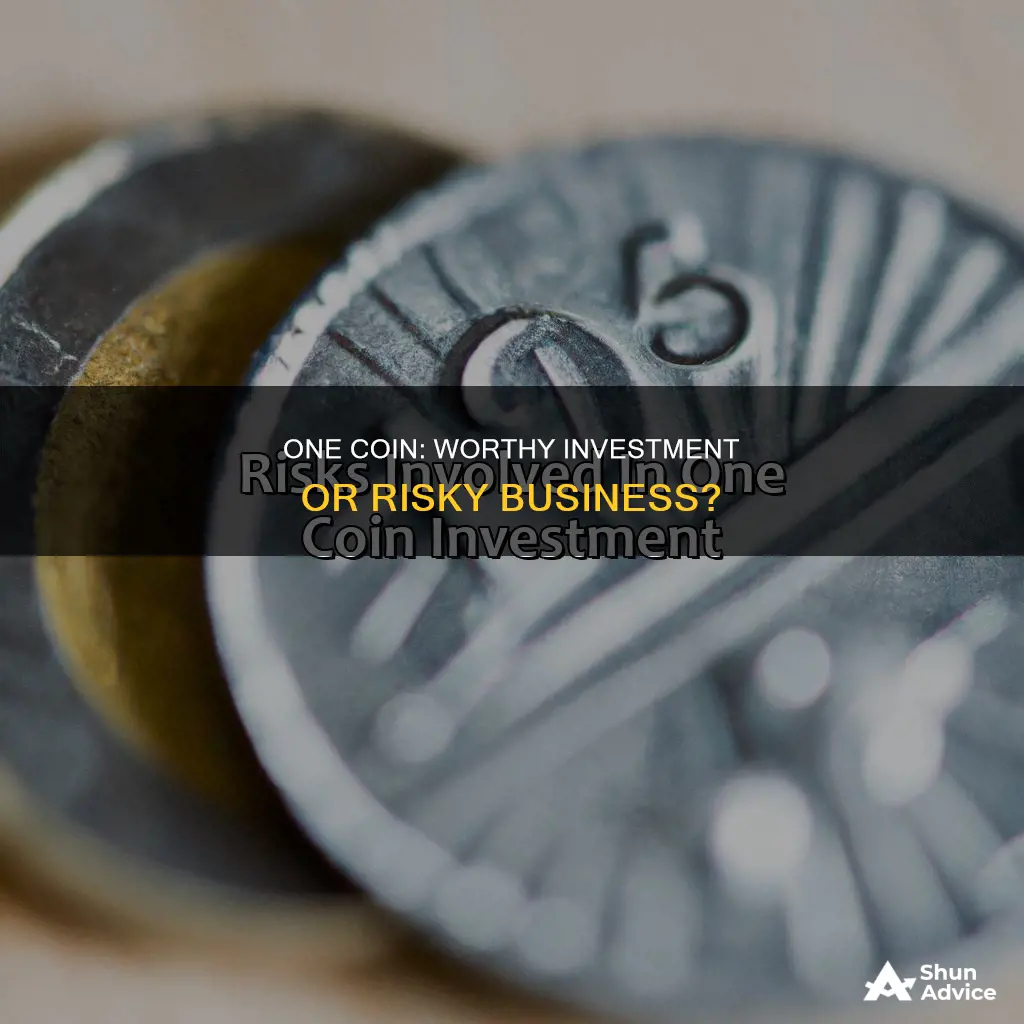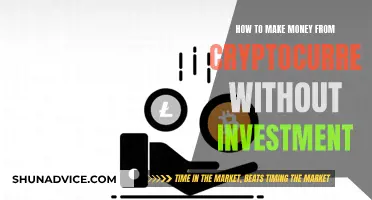
OneCoin is a fraudulent cryptocurrency scheme that scammed people out of approximately $4 billion. It was founded in 2014 by Ruja Ignatova, also known as the cryptoqueen, alongside Konstantin Ignatov and Sebastian Greenwood. The company operated as a Ponzi scheme and a pyramid scheme, targeting people with little knowledge of cryptocurrency and technology. OneCoin's organisational structure involved paying early investors using money obtained from newer ones and recruiting investors without providing any actual product. It is important to be cautious when considering investing in cryptocurrency and to do thorough research to avoid falling prey to scams such as OneCoin.
| Characteristics | Values |
|---|---|
| Type of Investment | Cryptocurrency |
| Company Structure | Offshore companies OneCoin Ltd and OneLife Network Ltd |
| Founders | Ruja Ignatova and Sebastian Greenwood |
| Launch Year | 2014 |
| Business Model | Selling educational material for cryptocurrency trading |
| Investment Packages | 100 euros to 228,000 euros |
| Payment Method | Fiat currency |
| Exchange Platform | OneCoin Exchange ("xcoinx"), |
| Regulatory Status | Warnings and prosecutions by authorities in multiple countries |
| Allegations | Pyramid scheme, Ponzi scheme, money laundering, fraud |
| Current Status | Legal proceedings ongoing |
What You'll Learn

OneCoin is a scam
OneCoin, founded in 2014, is a fraudulent cryptocurrency scheme conducted by offshore companies OneCoin Ltd, based in Bulgaria and registered in Dubai, and OneLife Network Ltd, registered in Belize. Both companies were founded by Ruja Ignatova, also known as the "cryptoqueen", in concert with Sebastian Greenwood. OneCoin is considered a Ponzi scheme due to its organisational structure of paying early investors using money obtained from newer ones. It was also a pyramid scheme, as it recruited investors without providing any actual product.
OneCoin was not a decentralised cryptocurrency but a centralised pyramid scheme hosted on OneCoin Ltd's servers, which was marketed as a cryptocurrency. The scheme was set up by Ruja Ignatova, with Sebastian Greenwood acting as the lead distributor in the pyramid.
OneCoin's main business was selling educational material for cryptocurrency trading. Investors could buy “educational packages” costing anywhere from 100 euros to 118,000 euros, or even 225,500 euros, according to one industry blog. According to a suit filed by former investors, much of the content in those packages was plagiarised from various free sources, including Wikipedia. Investors also received “tokens” that could supposedly be assigned to mine OneCoins, although no actual mining process existed.
The only way to exchange OneCoins for other currencies was through the OneCoin Exchange, an internal marketplace for members who had invested more than a set amount. OneCoins could be exchanged for euros, which were placed in a “virtual wallet”, from which they could request a wire transfer. The marketplace had daily selling limits based on which package the seller had invested in, greatly limiting the amount of OneCoins that could be exchanged by the scam's victims.
OneCoin grew in popularity quickly, mainly using social media to target the mass public internationally. They claimed to have over two million users by 2016, which they said was more than any other cryptocurrency. By 2017, that number was supposedly as high as three million.
OneCoin has been described by The Times as "one of the biggest scams in history", and US prosecutors alleged the scheme brought in approximately $4 billion worldwide. In China, law enforcement recovered 1.7 billion yuan (US$267.5 million) while prosecuting 98 people.
The organisational structure of OneCoin mirrors that of a pyramid scheme, where everybody pays the person above them. There are two parts of the company: OneCoin itself, which deals with hosting and marketing the platform, and then there are the affiliates who bring people in, making a commission. Local promoters organise meetups and spread the OneCoin scam in their region, like ambassadors.
OneCoin is more than just a cryptocurrency scam. It has been compared to a cult because of its strong but ill-informed, quasi-religious following. The mining was fake, and the 'mining tokens' are worthless. OneCoin never had a blockchain and instead used a centralised SQL database.
Ruja Ignatova, OneCoin's founder, has been missing since 2017. Konstantin Ignatov, her brother and personal assistant, took over OneCoin but is now in jail in New York awaiting trial. Three people, including Ruja's brother, have been arrested in the USA, and Konstantin has pleaded guilty to charges of money laundering and fraud. The US authorities have placed a $5 million reward on Ignatova's head.
Mark Cuban's Crypto Portfolio: His Top Investments
You may want to see also

OneCoin's organisational structure
OneCoin is a fraudulent cryptocurrency scheme conducted by offshore companies OneCoin Ltd, based in Bulgaria and registered in Dubai, and OneLife Network Ltd, registered in Belize. The company was founded by Ruja Ignatova, who called herself the "cryptoqueen", in concert with Sebastian Greenwood. OneCoin is considered a Ponzi scheme due to its organisational structure of paying early investors using money obtained from newer ones. It has also been described as a pyramid scheme due to its recruitment of investors without providing any actual product.
The organisational structure of OneCoin mirrors that of a pyramid scheme, where everybody pays the person above them. There are two parts of the company: OneCoin itself, which deals with hosting and marketing the platform, and the affiliates who bring people in and make a commission. Local promoters organise meetups and spread the OneCoin scam in their region, acting as ambassadors.
OneCoin grew in popularity quickly, largely using social media to target the mass public internationally. They claimed to have over two million users by 2016, which they said was more than any other cryptocurrency. Much of what OneCoin told its followers was twisted truths and lies. For example, they claimed to have a market capitalisation of $4.5 billion in 2016 and that it would take one year to mine one Bitcoin, both of which are completely false.
OneCoin made money by selling plagiarised educational packages, which came with "mining tokens". They claimed that these tokens must be put into a mining system to get OneCoin. However, it is believed that the educational materials were only there to disguise the fact that people were buying tokens or OneCoin. Interestingly, the word OneCoin doesn’t show up in any of their educational packages.
Bitcoin Investment: Wise or Risky Move?
You may want to see also

OneCoin's co-founders
OneCoin is a fraudulent cryptocurrency scheme and Ponzi scheme conducted by offshore companies OneCoin Ltd, based in Bulgaria and registered in Dubai, and OneLife Network Ltd, registered in Belize. It was founded in 2014 by Dr Ruja Ignatova, also known as the "cryptoqueen", alongside her brother Konstantin Ignatov and Sebastian Greenwood.
Ruja Ignatova launched the OneCoin scam in 2014, calling herself the "cryptoqueen" and appearing on the front cover of prestigious business magazines such as Forbes Bulgaria. She argued that the banking system was outdated and echoed many beliefs held by the cryptocurrency community. She liked to compare OneCoin with Bitcoin, making it look like OneCoin was more successful. In 2016, OneCoin claimed to have a market capitalisation of $4.5 billion, just below Bitcoin.
In late 2017, Ruja disappeared as one of Europe's richest women after failing to show up at a OneCoin event in Lisbon, Portugal. She was last seen in public on her yacht in Sozopol on the Bulgarian Black Sea coast. It is believed that she may have been tipped off that the FBI was after her. She is currently on the FBI's wanted list and was formally charged in absentia with US authorities declaring OneCoin to be a fraud.
Konstantin Ignatov, brother of Ruja, took over OneCoin after her disappearance. Konstantin was caught at Los Angeles Airport waiting to fly back to Bulgaria after attending OneCoin meetings. He was arrested in March 2019 and pleaded guilty to charges of money laundering and fraud. He was sentenced to time served and agreed to hand over $118,000 in ill-gotten gains.
Sebastian Greenwood, the third co-founder, was the lead distributor in the pyramid scheme. He was arrested in 2018 and, in 2023, was sentenced to 20 years for wire fraud and money laundering. Greenwood made over $300 million from his involvement in OneCoin.
In summary, all three co-founders of OneCoin have been arrested, with two of them sentenced to prison time. The whereabouts of "cryptoqueen" Ruja Ignatova remain unknown, and she is currently on the FBI's Most Wanted Fugitives list.
The Ultimate Guide to Launching a Bitcoin Investment Firm
You may want to see also

OneCoin's investors
OneCoin is a fraudulent cryptocurrency scheme that scammed investors out of approximately $4 billion worldwide. It is considered a Ponzi scheme and a pyramid scheme due to its structure of paying early investors using money obtained from newer ones and recruiting investors without providing any actual product. The company claimed to be a "Bitcoin killer" and would become the number one cryptocurrency worldwide. However, it never had a blockchain and operated as a pyramid scheme.
OneCoin targeted people who were not well-educated on cryptocurrency and technology, using social media to spread its message and grow its following. They claimed to have over two million users by 2016 and sold educational packages that cost anywhere from 100 euros to 118,000 euros, with "mining tokens" that could supposedly be used to mine OneCoins. However, there was no actual mining process, and the tokens were worthless.
The organisational structure of OneCoin mirrored that of a pyramid scheme, with the company itself dealing with hosting and marketing, and affiliates bringing in new investors and earning commissions. Local promoters organised meetups and spread the scam in their regions.
As an investor, it is essential to do your research and understand the risks involved before investing in any cryptocurrency or financial scheme. Due diligence and a thorough understanding of the technology and business model are crucial to making informed investment decisions.
In the case of OneCoin, there were several red flags that should have been cause for concern. The company's claims of having the second-largest market capitalisation and that mining one Bitcoin would take a year were false. Additionally, the lack of a blockchain and the centralised database structure should have been warning signs. The limited options for exchanging OneCoins and the constant delays in opening their exchange should also have raised suspicions.
To avoid falling victim to similar scams, investors should educate themselves about cryptocurrency and investment scams, fact-check outlandish claims, and be wary of schemes that promise high returns with little risk. Diversifying your investments and seeking legal advice when necessary can also help mitigate risks.
Tai Lopez's Guide to Bitcoin Investing
You may want to see also

OneCoin's legal proceedings
OneCoin is a fraudulent cryptocurrency scheme run by offshore companies OneCoin Ltd and OneLife Network Ltd. The scheme has been described by The Times as "one of the biggest scams in history". US prosecutors alleged that the scheme brought in approximately $4 billion worldwide.
OneCoin was launched in 2014 by Bulgarian national Ruja Ignatova, who called herself the "Cryptoqueen". The company claimed to be a Bitcoin killer and that it would become the number one cryptocurrency worldwide. However, OneCoin never had a blockchain and operated as a Ponzi and pyramid scheme. The company's main business was selling educational material for cryptocurrency trading, which was mostly plagiarised from various free sources.
In 2016, questions started to arise about OneCoin as many countries began to investigate the company, with some calling it a pyramid scheme. In March 2016, the Direct Selling Association in Norway warned against OneCoin, comparing it to a pyramid scheme. In December 2016, the Italian Antitrust Authority adopted an interim injunction against the company, describing their activities as an "illegal pyramid sales system" and ordering them to cease promoting and selling OneCoin in Italy. In the same month, the Hungarian Central Bank issued a similar warning.
In 2017, OneCoin claimed it was the first company to become licensed by the Vietnamese government and legally allowed to be used as a digital currency. The Vietnamese government rebutted the claim.
In 2018, the Bulgarian police raided the company's office in Sofia at the request of the prosecutor's office in Bielefeld, Germany. Also, 14 other companies tied to OneCoin were investigated and 50 witnesses were questioned. OneCoin's servers and other material evidence were seized.
In May 2018, the Central Bank of Samoa banned all foreign exchange transactions related to OneCoin and OneLife. The bank described OneCoin as a very-high-risk pyramid scheme.
Ignatova disappeared in 2017 when a secret US warrant was filed for her arrest. Her brother, Konstantin Ignatov, took her position at the company. Konstantin was arrested in March 2019 and pleaded guilty to charges of money laundering and fraud. In November 2019, he was sentenced to a maximum of 90 years in prison.
In July 2018, co-founder Sebastian Greenwood was arrested in Thailand and imprisoned pending extradition to the United States. In September 2023, Greenwood was sentenced to 20 years in prison by a New York Federal court.
In March 2023, OneCoin's former legal and compliance officer, Irina Dilkinska, was caught and extradited from Bulgaria to the United States. In April 2024, she was sentenced to four years in prison for her role in the fraudulent scheme.
Ignatova remains at large and was added to the FBI's top 10 most wanted list in 2022. US authorities have placed a $5 million reward for information leading to her arrest.
Siacoin: A Worthy Investment or a Waste of Money?
You may want to see also
Frequently asked questions
No, OneCoin is not a good investment. It is a fraudulent cryptocurrency scheme and has been described as "one of the biggest scams in history". It is considered a Ponzi scheme and a pyramid scheme, and its founders have been arrested and charged with money laundering and fraud.
OneCoin targeted people who were not well-educated on cryptocurrency and technology. They used the terminology of real cryptocurrencies and made false claims to appear genuine. They sold educational packages for prices ranging from 100 euros to 228,000 euros, along with "mining tokens" that were worthless.
OneCoin was founded by Ruja Ignatova, also known as the "cryptoqueen", and Sebastian Greenwood. Ignatova disappeared in 2017 when a secret US warrant was filed for her arrest, and she is currently a fugitive. Greenwood was arrested and sentenced to 20 years in prison for wire fraud and money laundering.
It is estimated that the OneCoin scam brought in approximately $4 billion worldwide. The authorities are still investigating the whereabouts of the money, and many investors fear considerable losses.







